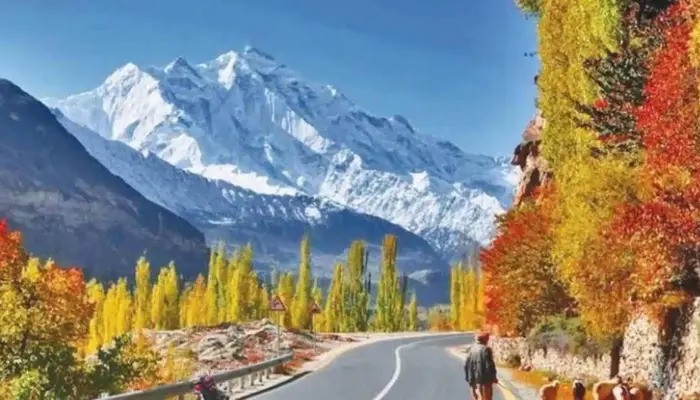GILGIT – The National Disaster Management Authority’s (NDMA) National Emergencies Operation Centre (NEOC) issued a Glacial Lake Outburst Flood (GLOF) alert on Wednesday for Gilgit-Baltistan and other northern areas, citing an alarming mix of persistent heatwaves, intensified monsoon currents, and a prevailing westerly wave. The situation, experts say, is a direct outcome of accelerating climate change.
On the same day, a melting glacier triggered a sudden flash flood in the Burundubar stream, which flows into Attabad Lake — a major tourist hotspot. According to Rescue 1122, the floodwater surged into the premises of the Luxus hotel, where a large number of local and foreign tourists were staying. The incident cut off land access and created panic among those trapped.
More than 160 tourists and hotel staff were successfully evacuated by boat. The flood also damaged surrounding trees, land, and property, adding to the devastation. The event served as yet another grim reminder of how climate change is now disrupting tourism and endangering lives in Pakistan’s northern regions.
Rising Temperatures Cause Widespread Destruction
Elsewhere in Gilgit-Baltistan, rising temperatures caused flooding in Barga Nallah, Skardu. According to police reports, the floodwater entered homes and damaged crops, triggering widespread destruction in the area. Residents faced significant losses, and recovery efforts are still underway.
Environmental Protection Agency (GBEPA) Director Khadim Hussain confirmed that the frequency and severity of glacier melt disasters have sharply increased in recent years. He directly linked this dangerous trend to global climate change and region-specific factors.
“In the past, snowfall arrived in November or December and gradually turned into ice. Now it comes in February or March, and due to heatwaves, it melts rapidly instead of forming glaciers. This rapid melt leads to flash floods,” he explained.
Mr Hussain added that deforestation, unregulated construction, population growth, and increased tourism pressure have worsened the situation. These localised human activities are compounding the effects of global climate change and making the region more vulnerable to natural disasters.
Climate Change Poses National Threat
An environmental expert warned that Gilgit-Baltistan’s challenges are not isolated. “This isn’t just a GB issue — it affects the entire country. Gilgit-Baltistan glaciers produce 80% of Pakistan’s agricultural water,” he said.
The expert also pointed out the lack of preparedness and awareness on the part of the local government. “People living downstream near rivers and glaciers don’t even have time to react when floods come. There’s been very little effort to reduce these risks or educate the population.”
Despite the clear and growing threat, the Gilgit-Baltistan government has been slow to prioritize climate change mitigation or implement proper safety measures. With glacier melting disasters becoming more frequent, experts are urging urgent action at both provincial and federal levels.
Follow us on Instagram, YouTube, Facebook,, X and TikTok for latest updates
